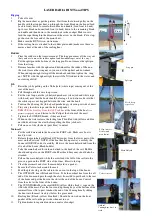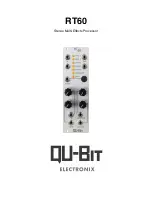
18
2
Control
Crossfeed
The CROSSFEED control interacts with a complex analog circuitry that
– simply put – serves to simulate the listening experience from loud-
speakers on headphones. The ON switch below the control activates
and deactivates the circuitry. CROSSFEED regulation is always applied
to both headphone outputs simultaneously and is present at the head-
phone outputs only (no effect on the speaker outputs).
Adjustments can be made between a minimum and maximum value.
The more you turn the control to the right, the more of the headphone’s
super stereo width is reduced – in a maximum setting almost up to a
mono signal impression.
Adjusting CROSSFEED is an individual process. Depending on head-
phones, music, individual preferences etc., your CROSSFEED adjust-
ment simply should achieve the most significant advantage in monitor-
ing your stereo mixes. We recommend comparing CROSSFEED settings
to your own speaker monitors in order to get a familiar imaging – this
ensures coherent conditions in speaker and headphone monitoring.
The circuitry for the CROSSFEED control is derived from the reference
headphone amplifier
Phonitor
. In the
Phonitor
, the loudspeaker imag-
ing simulation is realized with three controls: Crossfeed, Speaker Angle
and Center Level. The
Phonitor
Crossfeed control allows to adjust the
frequency-dependent crossfeed simulation of both channels by adjust-
ments of interaural
level difference
. The Speaker Angle switch provides
for frequency-dependent simulation of your stereo image width by ad-
justments of interaural
time difference
. Finally, with Center Level you
can adjust the intensity of center signals – the relation between center
and side signals changes when the super stereo width is transferred to
a stereo image that is equivalent to loudspeakers.
For the
2
Control the parameters “Speaker Angle” and “Center Level”
are adjusted to a simulated speaker angle positioning of 30 degrees
(the standard speaker angle) at the respective CROSSFEED settings.*
* also refer to Dipl.-Ing. Eberhard Sengpiel, http://www.sengpielaudio.com/
LaufzeitdifferenzenBeimNatuerlichenHoeren.pdf.
Control Elements
ON
CRO
SSFEED
0
1
2
3
4
5 6
7
8
9
1
0
Summary of Contents for 2Control 2860
Page 21: ...2Control 21 Block Diagram...







































